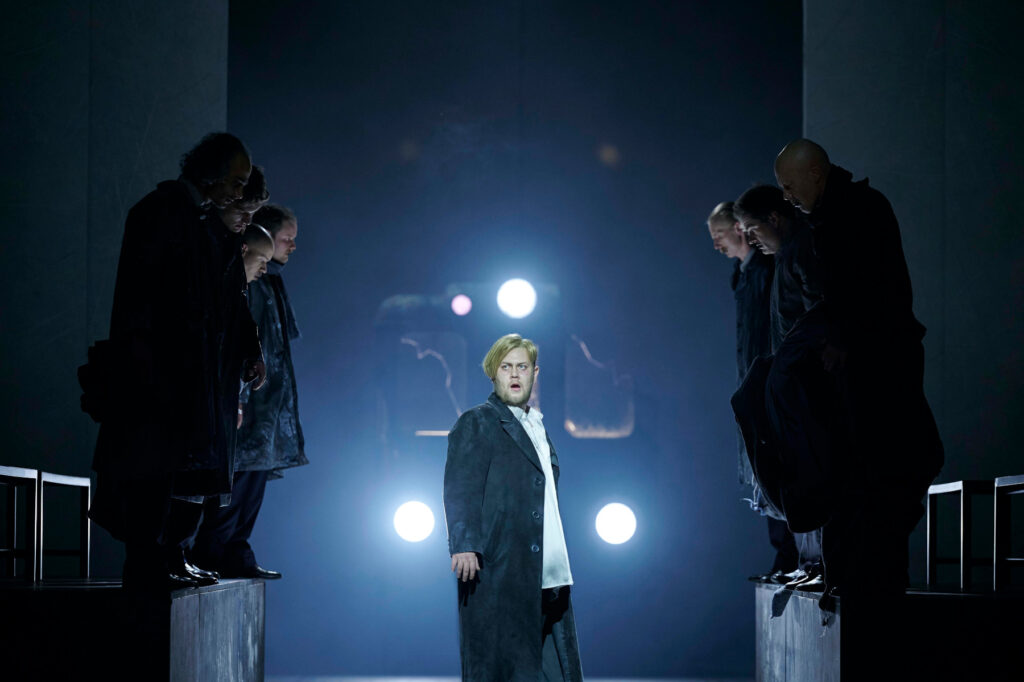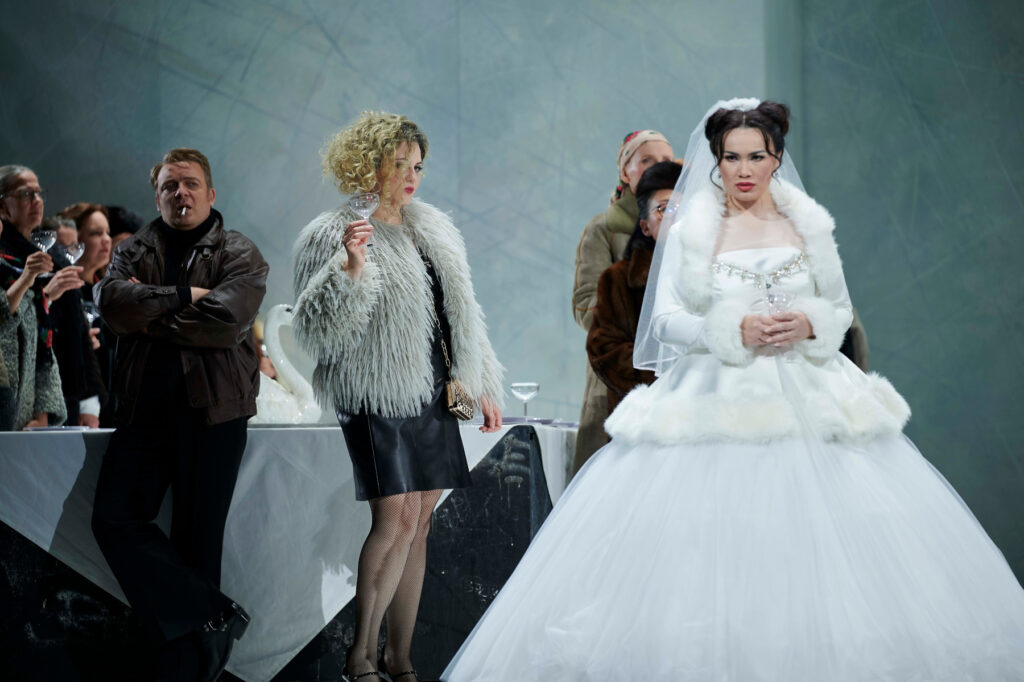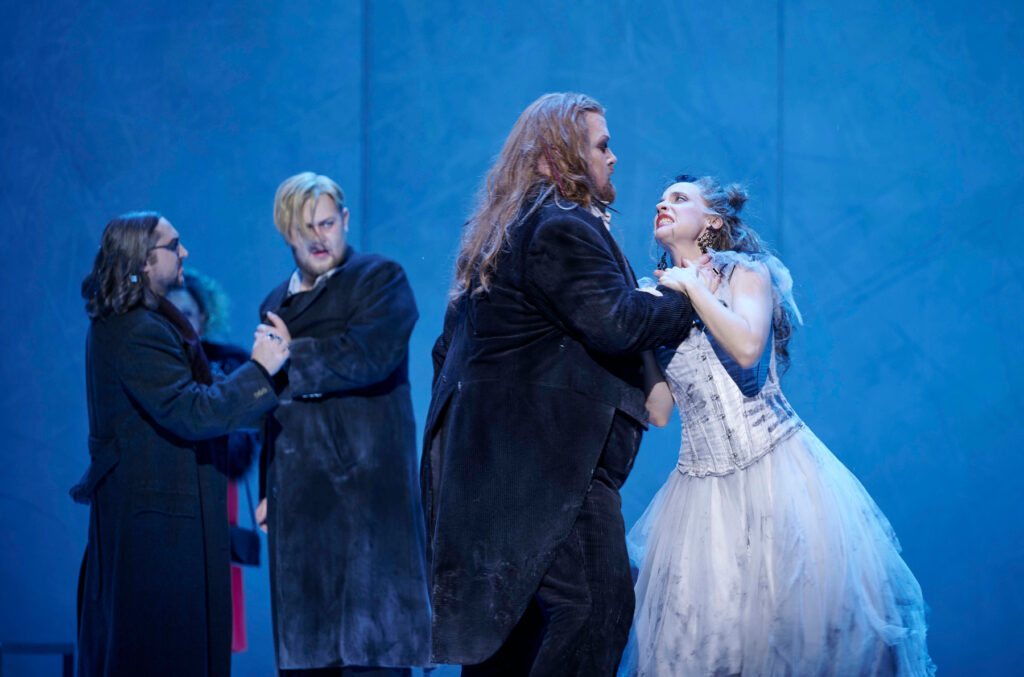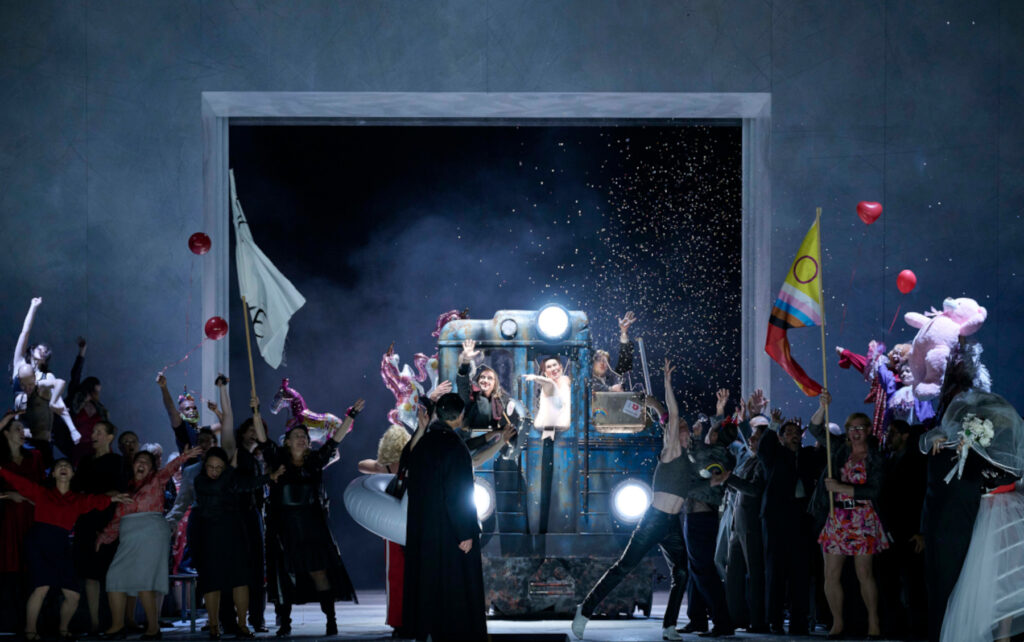There are a number of instances where the overture is much better known than the entire opera. One of those is Glinka’s Ruslan and Lyudmila. Little other music by this composer has found its way into modern concert programmes, though his operas were to be the starting point for the 19th-century Russian operatic tradition on which the five members of The Mighty Handful were later to build. Pushkin’s 1820 narrative poem modelled around a traditional Russian epic hero provided the original inspiration for Glinka’s second opera. The poet was commissioned to write the libretto but was killed in a duel before he could start, so it was left to the composer and five others to fashion the text. The story itself is not unduly complicated. Ruslan’s intended bride, the daughter of the Grand Prince Vladimir of Kyiv, is kidnapped by the evil dwarf-magician Chernomor, and he has to undergo a number of trials before he can be reunited with his Lyudmila. In thematic terms, certain staple ideas predominate: the victory of good over evil, love over hate, life over death.

For someone who received no formal musical education, Glinka’s music on display in Ruslan and Lyudmila is quite remarkable. He was certainly influenced by the bel canto tradition of Bellini and Donizetti; there are signs too of the exotic folk music of the Caucasus region as well as French grand opéra, very popular in Russia in the early part of the 19th century and evidenced in the five-act design. Above all, his daring chromatic harmonies point forward to Rimsky-Korsakov, with an instrumentation that includes a wide range of percussion instruments together with piano, harp and glass harmonica. There are extensive ballet sequences (the music at the start of Act 3 could easily have come straight from Tchaikovsky’s pen) and striking writing for the chorus. Why is the work not more popular outside Russia, one might ask. The story is essentially episodic, consisting of various tableaux and without much dramatic impetus. It is difficult to stage this opera while retaining the original flavour of the conception yet allowing for satisfying modern twists in interpretation. Chernomor is a silent character and completely missing in this latest production. Most of the male characters are bass voices so there is insufficient variation. Yet a lot of the writing for the protagonists and the orchestra is beautiful, imaginative and colourful in a way that impressed both Berlioz and Liszt.
In charge of this new production for Hamburg State Opera, including stage designs and costumes are the Hungarian partnership of Magdolna Parditka and Alexandra Szemerédy, who will be making their Bayreuth debut in Rienzi in the summer of 2026. Sad to recount, I found little that was aesthetically pleasing and, even more troubling, not much connection with the world of Russian fairy tales either. The sets are uniformly dark and gloomy, with blacks, greys and whites compounding the murkiness. Parditka and Szemerédy situate the middle acts inside an oppressive underground transport system, which in turn becomes a vehicle for exploring psychoanalytical depths and childhood traumas. The resulting inner convolutions include video projections which show a young female figure-skater, dancing solo and with a partner. She is under duress to achieve a high level of technical perfection in order to satisfy her overbearing father whilst struggling to establish her own identity. A brief interlude in which they appear wearing ice-skates on stage is intended to highlight the difficulty of maintaining any relationship where balance and harmony can easily be threatened by the instability of ice beneath. Several decades ago, in a groundbreaking work, Bruno Bettelheim drew attention to the meaning and importance of fairy tales, and Angela Carter is one of many writers who have used fantastic imagination to enhance our understanding of deeper connotations. Dream sequences, as used here by Parditka and Szemerédy, are a legitimate method of layering meaning. When all of this degenerates into psychological and political point-making, however, and the narrative flow is undermined, there is really very little gain.

The first act is anything but festive: a stark banqueting hall with long tables encased in white tablecloths at which the guests, including the military, are seated. Use is made of a revolving stage, which rotates rather too often for my liking during the course of the opera, in order to show the opposite end of society: down-and-outs, junkies and the homeless are seen cowering in front of an expanse of grey wall, covered in graffiti. In Acts 2, 3 and 4 trains arrive from left and right, enabling passengers to arrive and depart, accompanied by loud clattering and banging which on the night implied an absence of efficiency in managing the stage mechanics. At one point, front lights blazing, the train heads centrally down the track towards the audience, giving Ruslan an opportunity to contemplate suicide by throwing himself in its path. Anybody who knows the superb metro systems in St Petersburg and Moscow will be shocked. Platforms surrounded by grey walls carrying Banksy-type images and yet more graffiti simply look and feel oppressive, relieved only by a number of ramshackle kiosks. The only connection to anything Russian comes with display screens (in Cyrillic and Latin scripts) announcing trains for particular destinations together with inscriptions for the kiosks.
Act 3 of Glinka’s opera is supposedly set in the magic castle of the evil sorceress Naina. Instead, a series of open kiosks spanning the entire stage suggest a fairground bustling with merrymakers, dancing horses on sticks and red hearts underlining the fun elements. Couples canoodle at the bar, a prostitute plies her trade. A lot of cross-dressing is in evidence, which throws up a focus on gender fluidity and identity. Later, the outer fairground gives way to two inner kiosks displaying bridal garments and formal dress for the groom. Just before Ratmir, a knight and Ruslan’s friend, disrobes to reveal black corsetry, he delivers a key line in the text, “Dreams travel through the soul during sleep”. Lovingly fingering parts of a wedding trousseau, he reveals that “A passionate dream travels through my body”.

Lyudmila has mysteriously disappeared since the opening banquet celebrations, only to reappear in Act 4 in Chernomor’s enchanted garden. She sings an extended aria in which she laments her situation – “storm clouds cover my sky” – and ponders taking her own life. Giving her support in her distress is the concertmaster, who takes centre-stage to play an eloquent Kreisler-style solo. She then swallows pills which send her into a deep slumber, subsequently reclining on a bed of red roses in another kiosk which does duty as a flower-shop. Even the efforts of a doctor with a hypodermic syringe and Ruslan himself are unable to revive her and she is carried off on a stretcher. In the final act the banqueting-hall is now peopled with a congregation of mourners gathered around her open coffin, while snow falls inexplicably from above. At this point the childhood figure of Lyudmila, symbolised by her skating-boots, is replaced by the reawakened adult woman, declaring that “it was all a dreadful dream”. In the ensuing celebrations a rainbow flag is given particular prominence.
Given the significance of traditional fairy tales which Glinka, “the father of Russian music”, and indeed Pushkin too felt indebted to, the erasure of virtually all the specifically Russian elements in this production, and the failure to provide any imaginative stage representation of magic and sorcery left me more than slightly alienated. If only there had been more overall coherence, the underlying implications of a search for individual identity accompanied by contemporary preoccupations with gender attribution might have been more persuasive. Instead, I felt too much of an overtly political nature was being crammed into a frame which was ill-suited to accommodating such ideas. One in particular was the sudden appearance of the vice squad in Act 3 who beat “the undesirables” with their cudgels.

The huge disappointments inherent in this production were partly redeemed by the high quality of the singing. Nicky Spence, as the benevolent sorcerer Finn, looking like a slightly scruffy master of ceremonies complete with top hat, was an authoritative figure throughout. In the only tenor role in the opera, he sang a long narrative ballad at the start of Act 2, detailing his heritage and the fraught relationship he had with his evil counterpart, the witch Naina, here sung by a suitably wily-sounding and seductive Kristina Stanek. The pain and desperation he felt at his rejection by her, and his essentially benign character were reflected in the warmth of his singing. Natalia Tanasii’s Gorislava, secretly in love with her master Ratmir, was both vibrant and self-confident in demeanour. Alexander Roslavets displayed his inky-black bass to good effect as Svetozar, Lyudmila’s father, but I missed a greater degree of forcefulness in characterisation. Alexei Botnarciuc as Farlaf, one of the knights competing for the hand of Lyudmila, sang an imposing Act 2 Rondo, with its echoes of Figaro’s “Largo al factotum” in Rossini’s The Barber of Seville. In vocal terms, there was much to admire in the Russian countertenor Artem Krutko’s assumption of the role of Ratmir. His range is truly remarkable, as impressive in the baritonal reaches of his lowest register as in the poise and clarity of his uppermost lines. His extended Act 3 aria, an example of loneliness writ large, was especially affecting.
The two title roles were well cast. I was enormously impressed with Ilia Kazakov’s Ruslan. Previously a member of the Vienna State Opera ensemble, he has now joined the house ensemble in Hamburg. His strongly projected singing of the text was delivered in warm, caramel tones, a splendid instance of a basso cantabile, and the depths of his despair in Act 2 were entirely heartfelt. The Usbekistani soprano, Barno Ismatullaeva, has previously sung Elisabetta in Donizetti’s Maria Stuarda in this house and will be singing Madame Butterfly later in the season. This is another voice of total assurance, touching in her Act 1 cavatina when she reveals to her father her sadness at leaving her homeland, and in commanding control of her many florid coloratura lines for her major Act 4 aria.
On paper the choice of conductor held out promise. Azim Karimov, Estonian-born but essentially Moscow-trained (under Rozhdestvensky), and in exile since the start of the war in Ukraine in 2022, frequently urged both orchestra and chorus on, but did not always evince a full-hearted response. The overture lacked fizz and zing, but there were several moments when his direction yielded rich and earthy sounds from the lower strings. Some of the instrumental detailing showed the inherent qualities in Glinka’s score: fine horn and flute solos, a plaintive oboe solo to accompany Ratmir’s long aria, and a wonderfully wailing clarinet commenting on Lyudmila’s continuing slumber. The many filigree patterns of chamber-like strings and woodwind were realised with considerable delicacy.
It is always frustrating when reviewers discover a mismatch between the intentions of the composer/librettist and what is represented on stage. It is just as frustrating when the character of a piece is altered almost beyond recognition.
Alexander Hall
Ruslan and Lyudmila
Opera in five acts to a libretto by Valerian Shirkov and others based on the eponymous poem by Pushkin
Music by Mikhail Glinka
Sung in Russian with surtitles in German and English
Cast and production staff:
Ruslan – Ilia Kazakov; Lyudmila – Barno Ismatullaeva; Farlaf – Alexei Botnarciuc; Bajan/Finn – Nicky Spence; Ratmir – Artem Krutko; Naina – Kristina Stanek; Gorislava – Natalia Tanasii; Svetozar – Alexander Roslanets; Chorus and Orchestra of Hamburg State Opera; Chorus Director – Alice Meregaglia; Violin solo – Konradin Seitzer; Conductor – Azim Karimov
Direction, stage design and costumes – Alexandra Szemerédy and Magdolna Parditka; Video – Janic Bebi; Lighting – Bernd Gallasch; Dramaturgy – Katinka Deecke
Further performances until 19 December 2025
Top image: The cast of Ruslan and Lyudmila
All photos © Matthias Baus